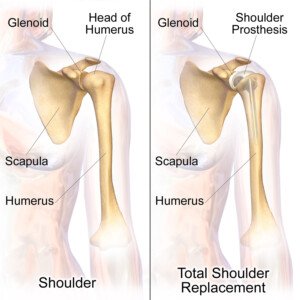
If you’re younger than 50, even in your 20s, and have a painful shoulder that doesn’t respond to conservative treatment, should you consider shoulder replacement surgery?
Chronic shoulder pain isn’t limited to “old” people.
Men and women under age 50 can suffer arthritic changes that cause ongoing problems in their shoulder.
Have you ever wondered about shoulder replacement surgery if your joint pain has begun to interfere with the quality of your life and has not responded to conservative treatments?
Arthritic degeneration can occur in people younger than 50.
“Anyone with a diagnosis of osteoarthritis of the shoulder (glenohumeral) joint can benefit from total shoulder replacement,” begins Barbara Bergin, MD, an orthopedic surgeon at and co-founder of Texas Orthopedics, Sports & Rehabilitation Associates.
“However, much like its lower extremity equivalents (total knee and total hip replacements), total shoulder replacement is not always ideal for everyone.
“Younger patients generally fall into a category of patients who may not have as successful an outcome as older individuals.”
A Drawback to Younger People Having a Shoulder Replacement Surgery

BruceBlaus/CreativeCommons
Dr. Bergin explains, “Younger patients are more likely to place a greater demand on their new, relatively painless prosthetics.
“This will then result in more rapid wear and ultimately, early failure.
“Many patients will offhand claim that they’ll take that chance, just for some temporary pain relief.
“But, it’s not that simple.
“Revisions are often fraught with complications. They are more likely to get infected, more likely to fail early as well, and ultimately, a joint can only undergo so many operations before something catastrophic occurs, resulting in permanent failure and disability, or worse.
“The older a patient is before having joint replacement, the more likely they are to have a successful, long-term outcome.”
This is because the older patient is less likely to try to repeatedly whack a tennis ball, heave a heavy barbell over his head, try to do 30 pushups in one minute or take a job in construction.
“And long-term survival of the operation is the key,” continues Dr. Bergin.
“Sure, younger patients may initially do well and feel better, but long-term success and pain relief is the goal.”






































